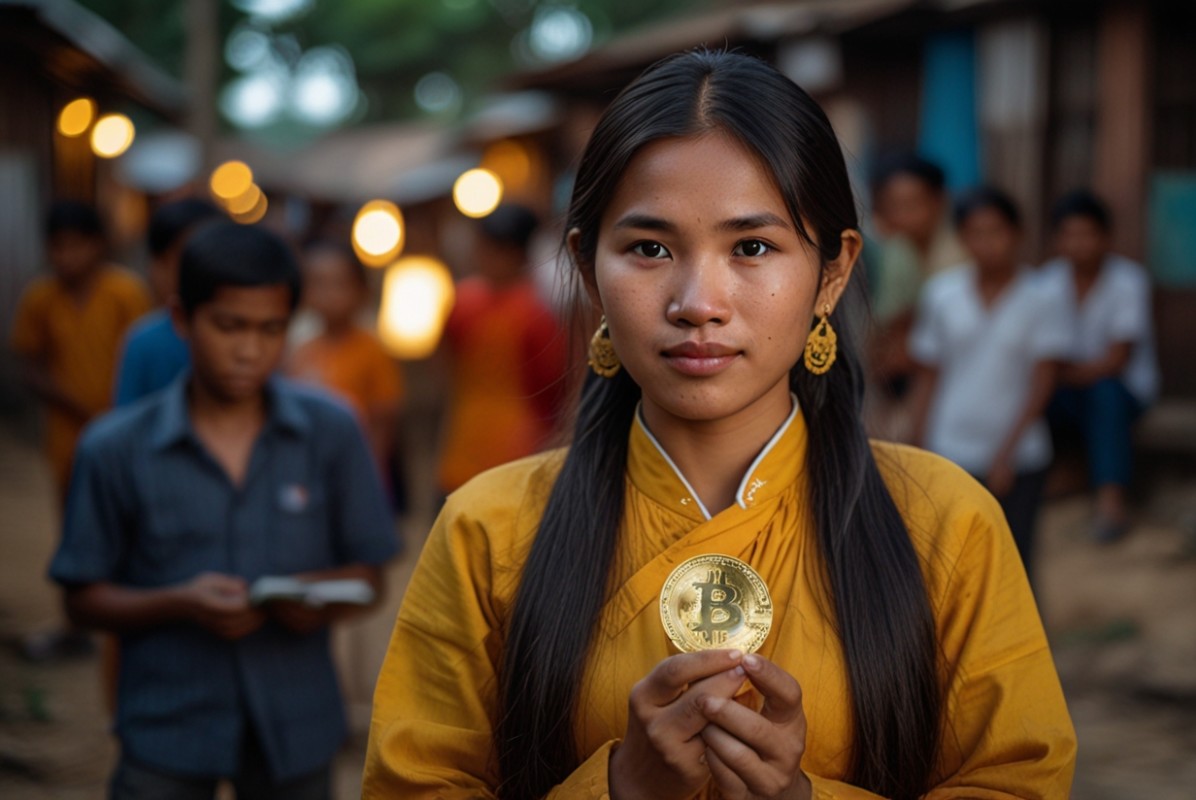
In a world where talent is everywhere, but opportunity is not, existing fiat systems perpetuate disparities between those with access to resources and those without. Even in democracies, with their own flaws, people generally enjoy stable currency, freedom, and the rule of law. These characteristics create an environment of opportunity, and ensure that where you start in life doesn’t have to dictate where you end up.
Bitcoin advocate and best-selling author Lynn Alden is a great example of overcoming obstacles and embracing the opportunities presented by a democratic society. Despite having been homeless for several years,She has worked her way up to become a well-known figure in the financial world, and her story is not uncommon: many refugees fleeing war and persecution find ways to adapt, innovate and thrive in their new homes, making significant contributions to the communities they move to.
For example, Jan Koum, co-founder of WhatsApp, said: I grew up without electricity in Ukraine.After moving to the United States, he worked as a cleaner in a grocery store for a few years before finally finding success. PayPal co-founder Max Levchin Tweeted He spoke about how he fled persecution in Russia and found success in America.My family and I, and thousands of Soviet Jews like us, came to the United States as refugees in 1991, fleeing a regime that persecuted us because of who we were.Another incredible immigrant success story is that of Mai Lee Chan, who was born to Vietnamese parents in a refugee camp in Thailand and knew only the word “toilet” in English when she started school in the United States. Chan overcame numerous obstacles to He is currently an engineer contributing to NASA’s Mars exploration mission..
But things are very different in authoritarian regimes, where one’s potential is often determined by the circumstances of one’s birth. Typically in such places, unless you are born into a family with ties to corrupt officials, i.e., you are the kid of the rich, your ability to innovate and entrepreneurship are systematically suppressed. In such regimes, the fiat system is not based on merit, but rather is rigged to favor such “kids of nepotism.” In other words, the system is based on nepotism, family ties, and corruption.
In the past, before the Internet and smartphones, ordinary people living in such harsh conditions simply accepted the harsh reality that they were destined to serve the dictator and his family. But today, Bitcoin has emerged as more than just a technology. It serves as a gateway to financial independence without compromising moral values. Bitcoin offers a powerful tool to break through many concrete barriers erected by oppressive governments.
Experience Suwan Thet Aung Swan, an AI entrepreneur from Myanmar (formerly Burma), shows how Bitcoin can be a lifeline for individuals facing the harsh reality of starting from scratch with no money or family connections. After founding his AI company in 2016, Swan’s startup grew rapidly and by 2020 Annual revenue of $300,000 or more.
Swan emphasized the importance of Bitcoin in maintaining financial integrity, February 2021 coupFour days after the military took control, he withdrew the company’s cash and exchanged it for Bitcoin and USDT, a decision made just a few weeks ago. Myanmar banks have begun restricting withdrawals His choice to keep his remaining US dollar assets in banks so that he could control his company’s assets as an individual or business entity unfortunately led to the loss of the majority of his company’s financial assets when Myanmar’s military junta enacted an extreme new monetary policy designed to conserve US dollars for the military. Issued by the Central Bank of Myanmar on 3 April 2022, this policy forced Swan’s US dollar reserves to be converted, without his consent, into Myanmar’s rapidly depreciating local currency (Myanmar Kyat) at a price 30% below market rate.
New Policy Mandated that “Residents in the country must remit foreign currency earnings earned overseas to Myanmar. These earnings must be sold and converted into Myanmar kyat within one business day through a bank that has an Authorized Dealer (AD) licence and opened a foreign currency account in Myanmar.”
For those living in countries with fairer and more equitable legal systems, such repressive monetary policies may be hard to understand. But Myanmar has a history of centralized financial institutions using their power to oppress its people. One notorious example is happened In 1987, the government suddenly demonetized the 25, 35 and 75 kyat notes, effectively eliminating 80% of the currency in circulation in the economy overnight.
recently, Myanmar’s violent military coup of 2021The Burmese military used tactics such as freezing the bank accounts of activists, journalists and supporters of the anti-coup movement, further demonstrating the junta’s tactics of oppressing people through a fiat currency system. Unfortunately, such abusive policies often work in places such as Myanmar, where people are so preoccupied with physical survival, putting food on the table and securing housing that they have little energy or interest to challenge or fight injustice.
Myanmar before 2010 had It has a lower mobile phone ownership rate than North Korea and a dictator. Than ShweThe regime in 2013 spread propaganda that the internet was simply a place to stream adult videos and discouraged internet use, but by 2016 the situation had changed dramatically, with social media, affordable smartphones and cheap SIM cards becoming widely available to the majority of the population.
Initially, Swan, a 32-year-old Burmese entrepreneur, had come to the U.S. to attend the GenAI event hosted by AWS in San Francisco with the intention of learning, gaining new experiences, and then returning to Myanmar. But during the trip, he was attacked by the Burmese military. Compulsory conscription lawdramatically changed the trajectory of his life. This law, combined with the financial instability caused by central bank actions, widespread socio-economic injustice, and the country’s hyper-surveillance system, were the catalyst for Swan’s decision to stay in the United States for a long time. He now lives in O1 Visa He continues to work and seeks to rebuild his dream in an environment with more opportunities for innovation and development. Although the United States has its own inequalities and domestic problems, many foreigners still see the United States as a great place to pursue their dreams and believe that hard work and innovation lead to success.
In an interview for this article, Swan reflected on his early startup days in Yangon, Myanmar’s largest city, when he founded the AI software company with two friends in 2016, at a time when Myanmar was emerging from more than half a century of isolation, undergoing major reforms and gradually increasing its participation in the international community.
“Human labor is cheaper in Myanmar than contract software,” Swan said. “Unlike chatbots for customer service, it makes sense for employers to hire staff for $100 a month and assign them multiple tasks, whether within or outside their job description.” While job losses to AI are on the rise in developed countries, in the developing world, poor working conditions and low labor costs will always trump AI, at least in places with limited electricity and no democracy (of course, low wages and poor working conditions also raise a host of ethical issues that must be addressed).
Swan then recounted the startup’s early struggles: “We spent almost all of 2016 developing the product because we didn’t have any customers. I was working a side job and living in a rented apartment with my parents, while my other two co-founders left the company to pursue other full-time jobs.”
Swan, who speaks Burmese and English fluently, said he faced social constraints while raising funds, mainly because Myanmar is an emerging market. Moreover, there were underlying social barriers. He had never worked abroad and had a degree from a university in Yangon. Unlike his privileged “fellow kids,” Swan does not come from a privileged background, so he struggled to find investors, even though his startup made $300,000 in annual revenue in 2020 and had signed deals with more than 1,000 business partners, including multinational companies such as Samsung, Unilever, Carlsberg, and Nivea.
If a protocol-based fundraising system like Bitcoin were available to entrepreneurs in developing countries, talented individuals like Swan could scale their startups, regardless of socio-economic status or whether they had a prestigious degree.
While Bitcoin is viewed as an investment asset class in developed countries or misunderstood as a technology that harms the environment, it is a lifeline, money, and access to global capital markets for talented people in developing countries trapped in an unfair monetary system that primarily benefits the privileged “cronies.” These talented people cannot afford to participate in the unfinished global debate on Bitcoin; rather, they are desperate to break out of a cycle of economic oppression. Thankfully, under Bitcoin’s standards, individuals have access to opportunity and economic freedom, ultimately contributing to a more equal and prosperous world community.
This is a guest post by Win Ko Ko Aung. The opinions expressed here are entirely their own and do not necessarily reflect the opinions of BTC Inc or Bitcoin Magazine.






